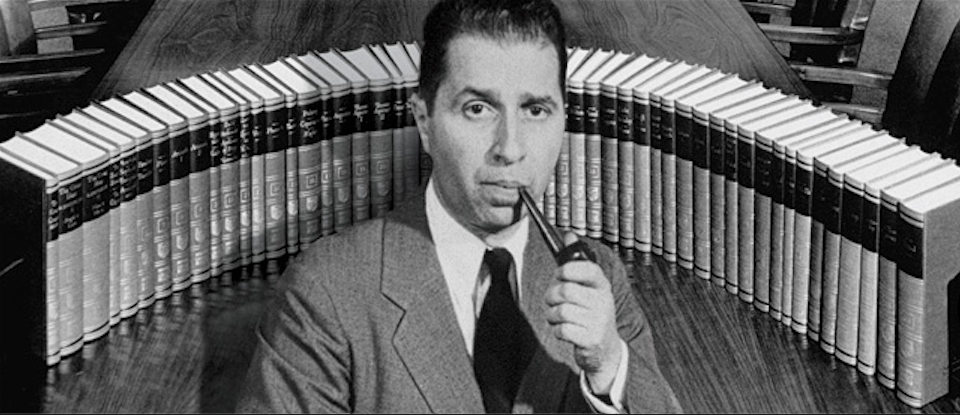Wednesday Wisdom from Thinker Mortimer J. Adler
On my Facebook and Twitter pages I have a weekly segment called #WednesdayWisdom, where I provide thoughtful quotes from great thinkers in various fields. The thinker that I most often quote is philosopher and educator Mortimer J. Adler. Adler influenced me significantly through his many books and public talks and I had the great pleasure of interacting with him through email shortly before his death at 98 years of age.
What follows is a brief biography of Adler along with four of his provocative quotes on philosophy and education that I’ve used in my social media #WednesdayWisdom segment. I also react to these nuggets of wisdom.
Who Was Mortimer J. Adler?
Mortimer J. Adler1 (1902–2001) was one of the most influential philosophers and educators of the twentieth century. He chaired the board of editors of Encyclopaedia Britannica and was editor of the Great Books of the Western World. He also worked as the director of the Institute for Philosophical Research. Adler especially appreciated the Aristotelian and Thomistic philosophical traditions as he rationally defended the existence of God and wrote about various theological topics. He converted to Christianity late in life, first joining the Episcopal Church and later becoming a Roman Catholic.
1. On Philosophy
- “It cannot be too often repeated that philosophy is everybody’s business. To be a human being is to be endowed with the proclivity to philosophize. To some degree we all engage in philosophical thought in the course of our daily lives.”2
Like Socrates, Adler thought everyone should lead an examined life. Adler often pointed out that according to Aristotle, human beings are distinguished from the animals by having the ability to ask philosophical questions. The ancient criticism of philosophy was that it “baked no bread” (lacked practical relevance). But Adler saw philosophy as indispensable; everyone used it in their day-to-day lives.
2. On the Life of the Mind
- “It is man’s glory to be the only intellectual animal on earth. That imposes upon human beings the moral obligation to lead intellectual lives.”3
Adler believed that human beings are different from the animals in kind, not merely in degree. He affirmed human exceptionalism. And, in accord with Aristotle, he thought one of the ways humans reflected this difference in kind was in their intellectual-philosophical abilities. But if the intellect sets humans apart, then people have an ethical duty to diligently pursue the life of the mind. Adler pursued the life of the mind as much as anyone I have seen.
3. On Careful Thinking and Learning
- “Do not say you agree, disagree, or suspend judgment, until you
can say ‘I understand.’”4
Adler was both a philosopher and an educator and he constantly emphasized the importance of careful thinking and learning. He recognized that an evaluation of something, whether good, bad, or indifferent, must begin with a genuine comprehension of the idea itself. Thus true knowledge and understanding must inform and guide one’s evaluation and response to any issue.
4. On Reading
- “You will not improve as a reader if all you read are books that are well within your capacity. You must tackle books that are beyond you, or, as we have said, books that are over your head. Only books of that sort will make you stretch your mind. And unless you stretch, you will not learn.”5
In the 1940s, Adler wrote a book on reading (How to Read a Book) that became a bestseller and a modern educational classic. In the 1970s, his colleague Charles Van Doren helped him revise the work. Adler distinguished between reading for information and reading for understanding. Thus, to grow in understanding one must be intellectually challenged. For Adler, the classic texts of Western civilization are sources of inexhaustible wisdom for human beings.
Mortimer J. Adler may have been the most educated person of the twentieth century. The more than 50 books he authored reflect his amazing life of thought, learning, and teaching.6 His diligence has provided all of us with plenty of #WednesdayWisdom.
Reflections: Your Turn
Are there public intellectuals that you’ve learned from? Who are they? Visit Reflections on WordPress to comment with your response.
Endnotes
- For more about Mortimer Adler and his accomplishments, see Kenneth Samples, “Christian Thinkers 101: A Crash Course on Mortimer Adler,” Reflections (blog), Reasons to Believe, December 20, 2016, https://www.reasons.org/reflections/read/reflections/2016/12/20/christian-thinkers-101-a-crash-course-on-mortimer-adler.
- Mortimer J. Adler, How to Think About the Great Ideas, Max Weismann ed. (Chicago: Open Court, 2000), xxiii.
- Mortimer J. Adler, Intellect: Mind over Matter (New York: Macmillan, 1990), 185.
- Mortimer J. Adler and Charles Van Doren, How to Read a Book (New York: Simon and Schuster, 1972), 162.
- Adler and Van Doren, How to Read a Book, 339.
- For my reflections on learning from Mortimer J. Adler, see Kenneth R. Samples, “Brilliant Teachers Once Removed: Gleaning Wisdom from Beloved Authors,” Reflections (blog), Reasons to Believe, May 13, 2014, https://www.reasons.org/reflections/read/reflections/2014/05/13/brilliant-teachers-once-removed-gleaning-wisdom-from-beloved-authors.






